Four others earn positions on ESA Governing Board
Annapolis, MD; September 1, 2021—Jennifer A. Henke, laboratory manager at the Coachella Valley Mosquito and Vector Control District in Indio, California, has been elected by members of the Entomological Society of America as the organization's next Vice President-Elect.
She will begin her term as VP-Elect at the conclusion of Entomology 2021, ESA's Annual Meeting, taking place in-person and online, October 31 – November 3, in Denver, Colorado. She will then serve as ESA Vice President beginning in November 2022, President beginning in November 2023, and Past President beginning in November 2024.
ESA members also elected four other members to begin or continue positions on the ESA Governing Board:
- Melissa Willrich Siebert, Ph.D., Corteva Agriscience, Plant-Insect Ecosystems Section Representative (re-elected)
- Don Weber, Ph.D., USDA Agricultural Research Service, Eastern Branch Representative (newly elected)
- Julien Saguez, Ph.D., Centre de Recherche sur les Grains, International Branch Representative (re-elected)
- Jesus Esquivel, Ph.D., USDA Agricultural Research Service, Southwestern Branch Representative (re-elected)
ESA members also voted on several other volunteer positions within the Society and ESA Sections and Branches, as well as Honorary Members:
For more information on the entomologists elected to the ESA Governing Board, see below:
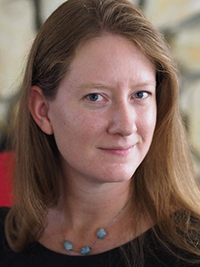 Jennifer A. Henke
Jennifer A. Henke
Coachella Valley Mosquito and Vector Control District
Bio: Jennifer A. Henke is the laboratory manager at the Coachella Valley Mosquito and Vector Control District. She has a B.S. in biology from the University of Alabama and an M.S. in entomology from the University of Georgia. Jennifer began at the District in 2011 as the environmental biologist. Since 2015 she has managed the laboratory group, which conducts adult mosquito surveillance, tests for arboviruses, examines pesticide product efficacy, and evaluates control products and strategies targeted at mosquitoes and fire ants. Her work includes collaborating with researchers from universities and government agencies to explore novel control strategies for vectors in the desert. Outside of work, Jennifer is likely to be found taking pictures, traveling to new places, or watching live music in southern California.
Past ESA activity or other volunteer service: Jennifer is currently the Pacific Branch Representative to the ESA Governing Board, and serves on the Executive Committee, the Finance Committee, and the Diversity and Inclusion Committee. She was the Pacific Branch President in 2019. Jennifer served on the Entomology Games Committee from 2012 until 2019 and served as the moderator of the competition at the 2016 and 2017 ESA Annual Meetings. She chaired the Regulatory Affairs Committee of the Mosquito and Vector Control Association of California from 2017 until 2020 and is still an active member. She is also on the MVCAC ad hoc committee on sterile insects. Jennifer has been a member of the American Mosquito Control Association's Science and Technology Committee since 2017 and is the current chair. She organized the AMCA poster competition judging from 2018 until 2020.
General candidate statement: I have been an active volunteer within ESA for two reasons. The first is that I want to give back to an organization that has been so welcoming to me in my career. The second is that I want this organization to be welcoming to others. Despite the active changes that ESA has undertaken to be a more responsive and leading society for professional entomologists, we know that not all members of our larger society have access to the joys of insects. I have a commitment to getting to the heart of the issues and a track record of completing work through difficult projects so we can improve ESA together.
VP-elect candidate statement:
ESA has a fantastic pool of resources—passionate volunteer leaders as well as having financial resources to fund strategic initiatives to improve our organization. We also have challenges—a need to continue diversifying our financial income, a push to develop all of our members, and a desire to highlight the role of entomology in everyone's life (not just ESA members). We have had leaders who have pushed us forward, forecasting that our publishing income would not be enough to fill the initiatives that we know are important for the professional development and fulfillment of our members.
We learned in 2020 that we are capable of great innovation and adopting new ways of working in the face of challenges. We also learned that there is much work to be done to build a more inclusive Society, at all levels. When I think of our strategic principles in ESA—that we must develop all of our members, that we are a global organization, and that we must increase our influence—I hope and believe that we could use some of our capacity for finding solutions to make our membership fully representative of the global community.
Despite our progress in some areas, I believe that we in ESA still have work to do. I would like to harness that can-do spirit to highlight obstacles that hinder the success of our members, work to remove them together, and to find ways for new or returning members to join us.
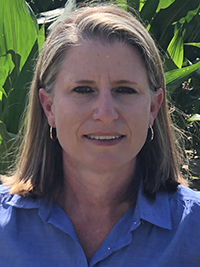 Melissa Willrich Siebert
Melissa Willrich Siebert
Corteva Agriscience
Bio: Melissa leads the insecticide and nematicide discovery and field science organization for Corteva Agriscience. She earned degrees from Texas A&M University (B.S.) and Louisiana State University (M.S. and Ph.D.) in entomology. Melissa has provided leadership for the development of insecticide and trait technologies, including Isoclast, spinosyns, pyraxalt, Widestrike cotton and SmartStax corn. Since 2004, her impacts have ranged from serving as an independent biology research contributor, leading a team of biologists toward launch of new concepts, leading a global team of project managers, and organization design to meet scientific and operational excellence. Melissa received the P-IE Recognition Award in Entomology in 2020.
Past ESA activity or other volunteer service: Melissa is a dedicated volunteer-leader. As the current P-IE Governing Board Representative, she was elected by her Board peers to provide leadership on the Executive Committee. She serves on the Ethics and Rules Committee, chairs the Leadership Development Committee, which produced member webinars designed to increase volunteer leaders. Additionally, she was elected as 2017 P-IE President, where she guided the influential "Science Policy Field Tour on Pollinator Health," which catalyzed three additional tours. She previously served as chair, ESA Publications Council; subject editor, Journal Integrated Pest Management; P-IE secretary; president, Mississippi Entomology Association; and current associate editor, Journal of Cotton Science.
Candidate statement: Through my volunteer leadership I have recognized the power of ESA members in shaping the strategy and overall success our Society enjoys today—core strengths exemplified in meeting execution, publications, science policy. Furthermore, I believe ESA has a key role, as an organizational platform and through its talented membership, for addressing entomological-related issues and grand challenges in science. As such, I am passionate about our Society continually assessing and responding to member needs as our science changes, ensuring that we have a strong culture of inclusiveness where all current and future member talents are welcomed and embraced, and to invigorate a strong opportunity for volunteer leadership.
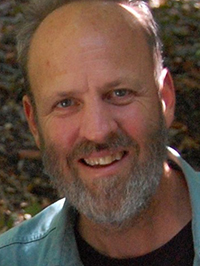 Don Weber
Don Weber
USDA Agricultural Research Service
Bio: Dr. Don Weber grew up in northern Virginia, received his B.A. at Williams College and M.S. in entomology at the University of California, Berkeley, with research on cole crop pests, and pursued his interest in fruit and vegetable IPM. Don's University of Massachusetts Ph.D. work researched biology and dispersal of Colorado potato beetle. After a stint at ETH Zurich, Don joined Ocean Spray Cranberries, where his research developed environmentally friendly IPM strategies for all growing regions. In 2002, he joined the Invasive Insect Biocontrol & Behavior Laboratory of the USDA-ARS in Beltsville, Maryland, as research entomologist and lead scientist, contributing to sustainable IPM tactics such as natural enemies and pheromones for major vegetable pests. He is author of 75+ refereed publications and eight book chapters, and coauthor of a recent biography of C. V. Riley.
Past ESA activity or other volunteer service: Active with ESA and the Eastern Branch (EB), Don has organized 12+ symposia at ESA meetings, judging 20+ student paper/poster competitions. He was EB president (2017-18); chair of the EB Nominations, Awards, and Graduate Student committees; and twice EB representative and chair of the ESA national Awards Committee and is current EB representative to the ESA Science Policy Committee. He was 2020 recipient of the EB Herb Streu Meritorious Service Award. Don was president of the International Organization for Biological Control's Nearctic Regional Section (2015-16) and is its current vice president. He was also chair of the Northeast SARE Administrative Council (2013-18), and served on grants panels including NIFA, AAFC Canada, and USAID. He was recipient of the USDA-ARS NE Area's Outreach, Diversity, and Equal Opportunity Supervisory Award (2015).
Candidate statement: I hope to faithfully represent the Eastern Branch on the Governing Board and actively solicit your input on how best to do so. ESA has made tremendous progress in recent years serving members in an efficient, inclusive, and financially stable manner. Tracy Leskey has represented us well, both for ESA and for our Branch. We will have continuing challenges though, which will include:
- assuring vitality and self-determination of the branches, in balance with sections
- continuing to welcome and promote diversity and meaningfulness for all members
- getting the most from our various publications and outlets, for ESA and all its members
- optimizing our meetings to support member needs and preferences post-pandemic.
This list is never complete. I want to know what are your priorities for your society! I am ready and willing to promote the priorities of all Eastern Branch members.
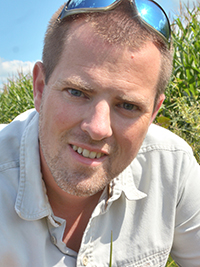
Centre de Recherche sur les Grains
Bio: Dr. Julien Saguez completed his Ph.D. in 2007 (Université de Picardie Jules Verne, France). His thesis focused on chitinases to manage aphids. From 2008 to 2015, he joined Dr. Charles Vincent's laboratory (Agriculture and AgriFood Canada, Saint-Jean-sur-Richelieu). He worked on the biodiversity and feeding behaviour of leafhoppers transmitting phytoplasmas on grapevine. Since 2015, he has worked for CÉROM, Centre de Recherche sur les Grains, (Saint-Mathieu-de-Beloeil, Canada) and conducts projects on field crop pests in a context of climate change and biosurveillance. He is involved in the provincial Pest Monitoring Network. He has authored or co-authored 24 peer-reviewed publications and six book chapters. Since 2008, Julien has initiated more than 4,500 students to entomology, visiting schools.
Past ESA activity or other volunteer service: Julien is a member of three entomological societies: Société d'entomologie du Québec (SEQ), Entomological Society of Canada (ESC), and ESA (Plant-Insect Ecosystems Section, Eastern and International Branches). From 2014 to 2017, Julien was member of the executive committee of the SEQ (president in 2015-2016). In 2015, he was involved in the organizing committee of the ESC-SEQ Joint Annual Meeting. In 2016, at the International Congress of Entomology, he co-chaired a symposium and, in 2018, he co-organized a symposium for the ESA, ESC, and ESBC Joint Annual Meeting. He has co-chaired several sessions of the International Branch virtual meeting from 2019 to 2021. Since 2018, he has served on the ESA Governing Board, representing the International Branch, and on several committees. He is also reviewer for ESA journals.
Candidate statement: During the three last years, I had the honor and the privilege to serve on the ESA Governing Board, representing the International Branch. I really appreciate my functions that give me the chance to represent all the international community and to meet extraordinary and enthusiastic people. I am involved in the Leadership Development committee and we are working on different tools to encourage volunteering. I am also involved in a focus group regarding ESA Branches. I would greatly appreciate to continue to be involved in these groups to promote the richness, the diversity, and the importance of the international community for and in ESA. I will also continue to support the activities of the International Branch.
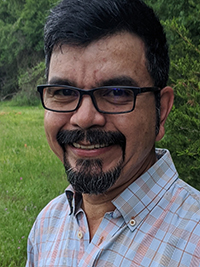 Jesus Esquivel
Jesus Esquivel
USDA Agricultural Research Service
Bio: Dr. Jesus F. Esquivel is incumbent Southwestern Branch (SWB) representative to the ESA Governing Board. He obtained his B.S. (agricultural education) and M.S. (general agriculture) from Tarleton State University, and his Ph.D. (entomology) from Texas A&M University. He is a research entomologist with the Insect Control & Cotton Disease Research Unit, USDA-ARS, in College Station, Texas. He has been an ESA member for 28 years, within the current Plant-Insect Ecosystems (P-IE) Section. His interests include hemipteran feeding mechanics and pathogen/plant interactions. Accomplishments include development of a mathematical model to estimate hemipteran stylet penetration potential, improved understanding of feeding mechanics and stylet morphology, and identified pentatomids as vectors of recent invasive bacterial and fungal pathogens of cotton.
Past ESA activity or other volunteer service: Dr. Esquivel has extensive ESA leadership service: Governing Board Southwestern Branch (SWB) representative; SWB past-president (2014), president (2013), vice president (2012), and secretary-treasurer (2011); Annual Meeting Program Committee co-chair (program, 2016; poster, 2017; student competition, 2015); P-IE Section representative on the ESA Awards & Honors Committee (2011-14); and chair and member of numerous SWB committees including Awards & Honors, Entomology Games, Membership, Nominations, Program, and Site Selection. He also served on the 2016 International Congress of Entomology Organizing Committee and is a Society of Southwestern Entomologists member (28 years), serving as president-elect (2009), president (2010), and past-president (2011) and Editorial Committee member (2009-2021) for the flagship journal Southwestern Entomologist.
Candidate statement: As the incumbent, my interests include continued engagement of, and voice to, the Governing Board on behalf of the SWB membership and providing governance counsel as liaison to assigned ESA Committees. My vision includes improved transparency on the governance process and enhanced Branch representation and inclusivity at higher leadership offices of the ESA. I feel I have provided sound, practical logic to the Governing Board and will continue to do so on behalf of the SWB and the general membership. Through my leadership experiences at the Branch, Section, and international levels, I feel that I have developed an improved understanding of ESA processes and governance that will enable me to continue representing the Southwestern Branch.
CONTACT: Joe Rominiecki, jrominiecki@entsoc.org, 301-731-4535 x3009
ABOUT: ESA is the largest organization in the world serving the professional and scientific needs of entomologists and people in related disciplines. Founded in 1889, ESA today has more than 7,000 members affiliated with educational institutions, health agencies, private industry, and government. Headquartered in Annapolis, Maryland, the Society stands ready as a non-partisan scientific and educational resource for all insect-related topics. For more information, visit www.entsoc.org.
